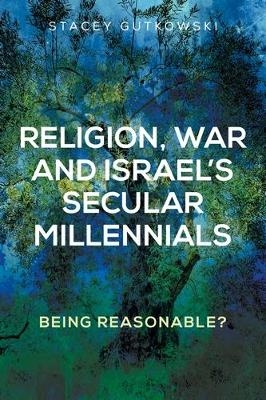
Religion, War and Israel’s Secular Millennials
Being Reasonable?
Seiten
2020
Manchester University Press (Verlag)
978-1-5261-3999-3 (ISBN)
Manchester University Press (Verlag)
978-1-5261-3999-3 (ISBN)
Based on fieldwork, interviews and surveys conducted in the aftermath of the 2014 Gaza War, this book explores what is it like to come of age as a ‘secular’ millennial in Israel after the failure of the Oslo peace process, when Palestinian and Israeli leaders have used ethnicity and religion to divide. It sheds new light on why peace may be further than ever. -- .
How do secular Jewish Israeli millennials feel about the Israeli-Palestinian conflict, having come of age in the shadow of the Oslo peace process, when political leaders have used ethno-religious rhetoric as a dividing force? This is the first book to analyse blowback to Palestinian and Jewish-Israeli religious nationalism among this group in their own words, based on fieldwork, interviews and surveys conducted after the 2014 Gaza War.
Offering a close reading of the lived experience and generational memory of participants, Gutkowski offers a new explanation for why attitudes to Occupation have grown increasingly conservative over the past two decades. Examining the intimate emotional ecology of Occupation, this book offers a new argument about neo-Romantic conceptions of citizenship. Beyond the case study, it also provides a new theoretical framework and methods for researchers and students studying emotion, religion, nationalism, secularism and political violence. -- .
How do secular Jewish Israeli millennials feel about the Israeli-Palestinian conflict, having come of age in the shadow of the Oslo peace process, when political leaders have used ethno-religious rhetoric as a dividing force? This is the first book to analyse blowback to Palestinian and Jewish-Israeli religious nationalism among this group in their own words, based on fieldwork, interviews and surveys conducted after the 2014 Gaza War.
Offering a close reading of the lived experience and generational memory of participants, Gutkowski offers a new explanation for why attitudes to Occupation have grown increasingly conservative over the past two decades. Examining the intimate emotional ecology of Occupation, this book offers a new argument about neo-Romantic conceptions of citizenship. Beyond the case study, it also provides a new theoretical framework and methods for researchers and students studying emotion, religion, nationalism, secularism and political violence. -- .
Stacey Gutkowski is a Senior Lecturer in Conflict Studies at King’s College London -- .
Introduction
1 Who is a secular Jew?
2 Generational memory
3 My Other, myself
4 Imagining jihad
5 No atheists in foxholes?
6 Imagining home(land)
Conclusion: Being reasonable?
Post-script: Religion, violence and the secular
Appendix: Research method
Bibliography
Index -- .
| Erscheinungsdatum | 10.05.2021 |
|---|---|
| Zusatzinfo | 15 tables |
| Verlagsort | Manchester |
| Sprache | englisch |
| Maße | 156 x 234 mm |
| Gewicht | 594 g |
| Themenwelt | Geschichte ► Allgemeine Geschichte ► Zeitgeschichte |
| Sozialwissenschaften ► Politik / Verwaltung ► Politische Theorie | |
| Sozialwissenschaften ► Soziologie ► Spezielle Soziologien | |
| ISBN-10 | 1-5261-3999-5 / 1526139995 |
| ISBN-13 | 978-1-5261-3999-3 / 9781526139993 |
| Zustand | Neuware |
| Haben Sie eine Frage zum Produkt? |
Mehr entdecken
aus dem Bereich
aus dem Bereich
Gewalt, Umwelt, Identität, Methode
Buch | Softcover (2024)
Spector Books OHG (Verlag)
36,00 €
wie Freud im Kollektiv verschwand
Buch | Hardcover (2024)
Klett-Cotta (Verlag)
25,00 €


